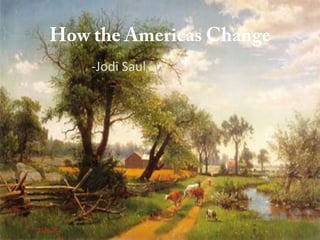
How the americas change
- 1. -Jodi Saul
- 2. The Americas in the 19th Century • Events like the gold rush in California caused a great change in the Americas • Because of the great poverty in in China, many were seeking to make a fortune to provide a better life • When word of the gold rush spread around the world it sparked a large scale migration to the United States • The migrants increased the ethnic diversity of the population and social and economic development • This lead to creating a more diverse America along with future battles for equality
- 3. Relation Between Canada and the U.S. • Both Canada and the United States gain independence from Britain • Canada managed to gain independence without war • Both Canada and the United States experienced divisions caused by the ethnic differences • The main division in Canada was between the British and French Canadians • During the war of 1812, Canada became unified in order to defend themselves from and external threat; despite their differences, they did not want to lose their independence • Eventually Canada experienced a time of rapid growth and this helped grow and unify the nation as a whole and gave benefits like expanding business opportunities
- 4. The Little Ice Age • Even weather can cause significant change in history • The little ice age created a huge change in Europe • It caused the death of thousands of people through many of its effects, not just from the colder temperatures • It spread disease and caused famines, because many of the crops that were being grown at the time were very sensitive to the cold and grew best in warmer temperatures • The people had to learn which foods would grow best in these temperatures • The potato grew very well in these temperatures but it took all their other crops being destroyed for them to actually begin growing and eating them
- 5. Frontiers of the Americas • The various frontiers of the Americas lead to the expansion and growth into the Americas we know today • In 1801, America had been dealing with overpopulation • In 1803, the transaction of the Louisiana Purchase took place • The Louisiana Purchase doubled the size of the nation as it including 6 states • Included in this purchase was the Mississippi river • It became an important factor in the farming world • This boost in farming helped increased trade, and all of this helped the nation’s economy
- 6. Frontiers of the Americas • Sometimes, frontiers were people simply venturing to unseen places to discover what they could • The frontier of the unknown was important to people of this time; the desire for discovery fueled expeditions and contributed to the expansion of the nation and increase in knowledge at the time • A well known explorer of this time was Prince Maximiliann of Wied-Neuwied • He was a German explorer who set out to study the culture of Native American tribes and gathered information observations of them • Maximilian brought along with him the artist Karl Bodmer to create paintings of what they saw • Bodmer was capable of representing the lives of the natives accurately as they were
- 7. Crossroads of Freedom The Battle of Antietam • Throughout the Civil War, President Lincoln was faced with the tremendous challenge of keeping the Union together • Lincoln was also dealing with the conflict in slavery • Before the battle in 1862, things had been going poorly for the North • On September 17, 1862, the battle of Antietam began, which ended up being one of the most significant battles in the war
- 8. The Battle of Antietam • The Union was forced to march next to each other through a corn field toward the enemy • Line after line, soldiers marched blindly being fired at constantly by the Confederates • The battle was disorganized and chaotic; people were dying rapidly • Despite this, Union soldiers continued to march side by side, refusing to leave their brother’s side • This strong sense of unity and devotion to each other is a major theme throughout the war • Their determination in remaining with their fellow soldiers lead to more and more deaths • Eventually the Confederates rand out of units and were forced to retreat; the union had gained control of the now obliterated cornfield
- 9. The Battle of Antietam • Not only were General Lee’s troops greatly weakened by this battle, but they were also suffering from hunger because they were poorly supplied • Soon another battle began in Sharpsburg, Maryland, and Confederate soldiers fought from the small protection of a sunken road • Union soldiers began to march towards them and once again, line after line of them were being gunned down • Despite so many deaths of soldiers, the Union kept marching towards the sunken road and eventually succeeded in reaching it • Once again their devotion and unity allowed them to send the Confederates into a retreat
- 10. The Battle of Antietam • Right after another battle broke out over a bride in which the Confederates were able to stop the Union advance • In the end, little ground was gained or lost, however there were about 23,000 casualties • During this time, Lincoln had been waiting to release his Emancipation Proclamation • He did not want to lose support on it because of the Unions position in the war, but when things began to look better for them, he was able to release it • His concern for keeping the Union together was the cause of its delay • It is said that this battle was key in allowing the Union victories in other pivotal battles